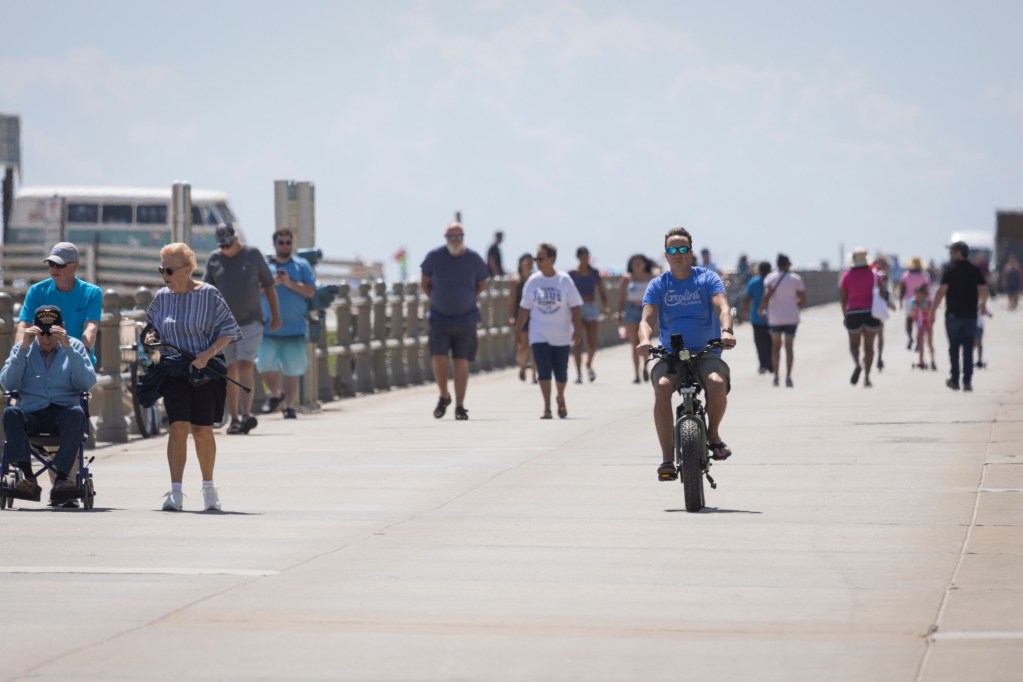The increasing popularity of e-bikes raises significant safety concerns, particularly for young riders. In a troubling incident reported recently, a ten-year-old boy rode an e-bike down a snow-covered street, towing another child on a sled. The sled veered off the icy road, crashing into a mailbox post. This alarming event highlights a broader issue as many parents observe children riding e-bikes at unsafe speeds on busy roads.
In her recent commentary, Janice Edgar expressed serious concerns about e-bike safety along the Virginia Beach oceanfront boardwalk. Current Virginia laws permit e-bikes to operate without special licenses or registration, creating potential hazards. Riders can be as young as ten and are allowed to use bikes that can reach speeds of up to 20 miles per hour, which is significantly faster than conventional bicycles. These e-bikes are treated similarly to regular bicycles, meaning they can be used on roads and paths where traditional bikes are allowed.
According to Virginia law, helmets are mandatory for all riders under the age of 18 and for operators of Class III e-bikes. Despite these regulations, Bob Newman, M.D., a family physician with over 40 years of experience, has observed frequent violations of these statutes. He notes that bicycle accidents are a major cause of pediatric injuries, particularly as e-bike usage increases.
Data from the U.S. Consumer Product Safety Commission reveals a concerning trend: e-bike injuries rose by 21% between 2021 and 2022. The Journal of the American Medical Association reported a staggering 49-fold increase in e-bike related head trauma cases from 2017 to 2022. In Virginia alone, data from 2023 indicates there were 160 bike crashes resulting in severe injuries and nine fatalities. The most common injuries include head and neck trauma, along with fractures, placing children at particular risk.
Several factors contribute to these alarming statistics. Many young riders neglect to wear helmets, and the increased speed of e-bikes poses additional risks. Traditional cyclists are already aware of the dangers of distracted drivers, who may not notice them on the road. Similarly, car drivers often misjudge the speed of e-bikes, assuming they are traveling slowly and making potentially dangerous maneuvers at intersections.
Interestingly, the rise in e-bike accidents has also benefited certain groups, particularly personal injury law firms that specialize in these cases. As the number of e-bike-related injuries grows, so does the demand for legal representation in these incidents.
Another concern surrounding e-bikes is their impact on childhood health. The prevalence of childhood obesity is a significant issue, often linked to poor dietary habits and a lack of physical activity. Children increasingly spend time on screens rather than engaging in outdoor activities. E-bikes allow them to exert less effort while riding, reducing the physical activity they obtain during their leisure time. Regular exercise, including cycling, has well-documented mental health benefits, making this trend particularly concerning as the mental health crisis among youths continues to escalate.
To address these pressing issues, Dr. Newman urges parents to actively supervise their children and remain aware of the risks associated with e-biking. He encourages parents to consider saying no to requests for e-bikes, emphasizing that safety should always come first.
Furthermore, there is a pressing need for improved enforcement of existing laws and the introduction of new regulations governing e-bike usage. This could include age restrictions and specified areas where e-bikes can be safely operated. While the joy of cycling and the freedoms of youth are important, ensuring the safety of young riders must remain the top priority.
Dr. Bob Newman resides in Norfolk, Virginia, and is the author of “Patient’s Compass,” a guide to navigating the complex health care system. He can be contacted via email at [email protected].





































































